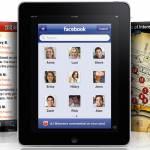Android picks up more US subscribers as Windows Mobile share plunges

Windows Mobile phones continue to bleed US subscribers, with Android devices picking up most of the lost subscriber share. Can you say free falling? Today, ComScore released standard handset and smartphone data for the three-month period of November 2009 to January 2010. ComScore designates the platforms by vendor. Microsoft smartphone subscriber share fell to 15.7 percent from 19.7 percent three months earlier. Meanwhile, Google rose to 7.1 percent from 2.8 percent during the same time period.
What about iPhone, for which American bloggers and journalists are seemingly obsessed? If Apple is gaining smartphone subscribers, it's not substantially showing in the data. Subscriber share rose from 24.8 percent to 25.1 percent, which is statistically negligible. Meanwhile, Research in Motion slightly climbed -- to 43 percent from 41.3 percent.
10 things Microsoft did right in 2010 (so far)

It's throw-Microsoft-a-bone Monday, not that I can promise much meat on it. Microsoft may have fallen behind in mobile, been talking about a three-screen strategy off of two screens, and clumsily competed as usual, but some early 2010 actions deserve at least a little praise. So here's where I give it.
First, some context. There's doing right -- and there's doing right. Some of the stuff here I'll assert Microsoft did right I previously dinged the company for getting wrong. That's because what's right for Microsoft might be wrong in a greater competitive landscape, like taking right action A too slowly or not soon enough. With that introduction, here are 10 things Microsoft has done right in 2010 (so far), presented in no order of importance. Microsoft...
Who should buy the iPad? Hint: People of a certain age (and that's not you)

"Who will buy?" is the question to ask now that Apple has turned on the advertising spigot. I saw the first iPad commercial three times during yesterday's Academy Awards program. No one should underestimate the power of Apple marketing for generating millions of initial iPad sales. Advertising will differentiate iPad from ebook reader or tablet competitors.
For years, Apple advertised iPod unchecked. Competitors simply didn't aggressively advertise their MP3 players. So from about 2002 through end of 2004, iPod owned media player advertising -- at least in the United States. For a short time, Creative had a campaign, then nothing after 2005. No wonder so many people bought an iPod -- it seemingly was the only choice.
So, iPad will change the PC industry? Yeah, right

It's fraking Friday and to celebrate Gartner analysts are predicting Apple's iPad is going to change everything you know about the PC market. Everything. Betanews readers, will you let such prognostications go unanswered?
"Apple's iPad is just one of many new devices coming to market that will change the entire PC ecosystem and overlap it with the mobile phone industry," Ranjit Atwal, Principal Gartner analyst, said in a statement. "This will create significantly more opportunities for PC vendors as well as significantly more threats." Threats to whom or to what? The traditional PC.
Will the smartphone replace the PC in three years?

It's the question to ask after the bold statement made yesterday by Google's John Herlihy. According to Silicon Republic, Herlihy told Digital Landscapes conference attendees that: "In three years time, desktops will be irrelevant. In Japan, most research is done today on smartphones, not PCs."
My answer is an easy "Yes" for desktops, assuming Herlihy meant desktop PCs. Mobile PCs will take longer -- not much, unless 3G radios come to be standard equipment on most laptops; that's for displacement, not irrelevance. Yesterday I asked Betanews readers: "Has your smartphone changed your life?" The smartphone most certainly will change your life if it displaces the PC. How much more dramatic will be the change whenever PCs should become irrelevant?
Steve Ballmer talks Bing, Google, Xbox and Windows Phone

For anyone that missed Microsoft CEO's Q&A during the Search Marketing Expo West yesterday, a transcript is now available online. I went through and picked out key quotes, so that you don't have to read the whole thing.
Several things stand out from Ballmer's comments:
Has your smartphone changed your life?

That's the question I pose to Betanews readers on this fine Spring afternoon. If "Yes" then please further answer: How has your smartphone changed your life?
I'm raising the questions today because of AFP news story "Australia is social networking capital of the world." (Mike Cherng tweeted the story -- my thanks to him.) Reporter Amy Coopes quotes Danielle Warby: "My smartphone changed my life. Serious. It has my calendar, all my contacts and is an easy and intuitive communication tool."
Got a Windows Mobile phone? There's no Windows 7 Phone Series upgrade for you

Could someone please give back Steve Ballmer's brain? He really needs it. The Web is buzzing about a Microsoft executive telling APC Magazine that existing Windows Mobile handsets will not be eligible for Windows Phone 7 Series upgrades. Is Ballmer, Microsoft's CEO, out of his fraking mind for letting this happen? Oh, right, someone took away his brain. Please return it.
What's all the fuss about? Firstly, the no-upgrade policy gives every possible Windows Mobile buyer every reason not to purchase. Secondly, the hottest WinMo phone, the HTC HD2, is suddenly a Windows Phone 7 Series brick. According to Natasha Kwan, Microsoft's Asia-Pacific region Mobile Communications Business GM, the HD2 "doesn't qualify because it doesn't have the three buttons." The smartphone has too much of a good thing--five buttons.
Pew Internet study offers Microsoft's mobile strategy a glimmer of hope

How disastrous is Microsoft's hobbled mobile strategy? Today's Pew Internet report, "Understanding the Participatory News Consumer," offers some glimpse and even some hope. The report reveals that more Americans than ever rely on their cell phones for news and other information. Speaking personally, I find the Google News widget on my Nexus One to be indispensable.
Fifty-three percent of US adults "access the Internet wirelessly either through a laptop or a cell phone, BlackBerry or other handheld device," according to the report. Adults? What about measuring teen Internet usage -- and not just cell phones but WiFi devices like Apple's iPod touch? (More griping about Pew overlooking teens will come later in the post.)
Let the Internet Explorer 6 death watch begin

All praise the great gods of the InterWeb for their divine intervention. March 1, 2010 is Internet Explorer 6's judgment day, when mighty Google and Microsoft looked down from the heavens -- or Mt. Olympus, if you prefer - and cast IE6 into the abyss. Starting today, Google is beginning to phase out support for Internet Explorer 6, while Microsoft presents European Union Windows users with a ballot screen for choosing even the most obscure browser, but not IE6. Microsoft's once mighty browser has fallen -- and not a second soon enough.
IE6's heart turned evil long ago. Microsoft released the browser in 2001 only to later let development languish. Only after Mozilla released Firefox in late 2004 and, around the same time, Google showed that bundled search could make browsers profitable did Microsoft start seriously working on IE7. But by the then, IE6's cold-hearted proprietary standards had polluted the InterWeb with wicked metatags.
Developers, save us from the Microsoft undead

More software developers should follow the lead of Adobe and Skype, which have abandoned Windows Mobile -- what Microsoft now calls Windows Phone Classic. The mobile operating system already was brain dead, even with, according to Gartner, 15 million unit sales in 2009. The heart pumped out licenses, but there was no brain activity to keep the platform going. Windows Mobile flatlined, and it's about time that some Microsoft developers admit it. Others should get over the denial and do the same. Microsoft doesn't have the courage to pull the plug. But smart developers can.
Skype's move was quite audacious -- pulling the Windows Mobile version of the telephony software from download. Those WinMo users with Skype can continue using it. Adobe is doing something different. It's shifting Flash 10.1 development to Windows Phone 7 Series, sidelining any Windows Phone Classic version. Both developers acted wisely. Microsoft may have kept Windows Mobile on life support by the Classic renaming, but the operating system has no real future. There's little reason for hardware manufacturers to release new Windows Phone Classic handsets or for anyone to buy them -- with Windows Phone 7 Series phones coming late in the second half of the year.
Apple should ban freebees from the iPad App Store

Apple shouldn't treat iPad like iPhone or iPod touch. The iPad App Store should be stocked full of premium content, meaning no freebees. It's the right way to help establish iPad as a premium product, as something special like the Macintosh. Unfortunately, Apple has little incentive to take this right approach benefiting its developers (because they make more money), customers (because they get better quality apps) and the iPad brand (because it comes be to viewed as a more premium product).
Apple's business is about selling hardware, using software and services as differentiators. Sure, Apple sold its 10 billionth song at iTunes yesterday, but the company's business isn't about selling content. The content is a means to selling more high-margin hardware. From that perspective, paid apps only marginally benefit Apple. Free is better, because there can be more applications, which is good for building out the App Store/iPhone OS device platform.
Google is a dangerous monopoly -- more than Microsoft ever was

The European Union's preliminary antitrust investigation of Google isn't the least surprising. But the timing is shockingly foreshadowing.
In December 2007, when Google announced the DoubleClick acquisition, I blogged: "The Google Monopoly Begins." I asserted that the acquisition would change everything about Google's search and advertising dominance and perceptions about the company's growing status as gatekeeper to all online information. The preliminary antitrust investigation comes as Google makes major changes to DoubleClick with hopes of boosting its display advertising business. The changes mark the final Googlefication of DoubleClick -- or the realistic, final integration of the acquisition into Google.
Android and iPhone smack down Windows Mobile

Worldwide, Windows Mobile smartphone operating system market share declined in 2009 to 8.7 percent from 11.8 percent a year later. Windows Phone 7 Series couldn't come soon enough -- if holiday 2009 could even be enough to hold back Apple's iPhone OS and Google Android.
The smartphone data comes from Gartner, which measures actual sales to customers rather than to carriers or dealers. By that reckoning, Windows Mobile sales only declined by 1.47 million units to around 15 million units year over year. By comparison, iPhone OS sales more than doubled -- to nearly 25 million units -- with share rise to 14.4 percent from 8.2 percent year over year. Android made significant gains -- and at the expense of other Linux-based smartphone operating systems, too -- with share rising from 0.5 percent in 2008 to 3.9 percent in 2009 on 6.8 million units shipped. Android made its biggest gains of the year during fourth quarter.
Email phishes for Windows Live IDs and passwords

The flu pretty much wiped out most of last week, which is just a blur to me. This morning, I started catching up on email and found a real frakker in my Windows Live Hotmail inbox. Someone wants to steal my Windows Live ID and password -- and probably yours, too. The message is dated Feb. 22, 2010.
The email caught my attention for several reasons: 1) Windows Live Hotmail didn't flag the message as junk or suspicious; 2) The apparent originating address -- "[email protected]" -- seems legit enough; 3) Sender is "Windows Live Team"; 4) The email effectively uses threats and cajoling.
Joe's Bio
Joe Wilcox is BetaNews executive editor. His motto: Change the rules. Joe is a former CNET News staff writer, JupiterResearch senior analyst, and Ziff Davis Enterprise Microsoft Watch editor.
Ethics StatementBetaNews, your source for breaking tech news, reviews, and in-depth reporting since 1998.
© 1998-2025 BetaNews, Inc. All Rights Reserved. About Us - Privacy Policy - Cookie Policy - Sitemap.
